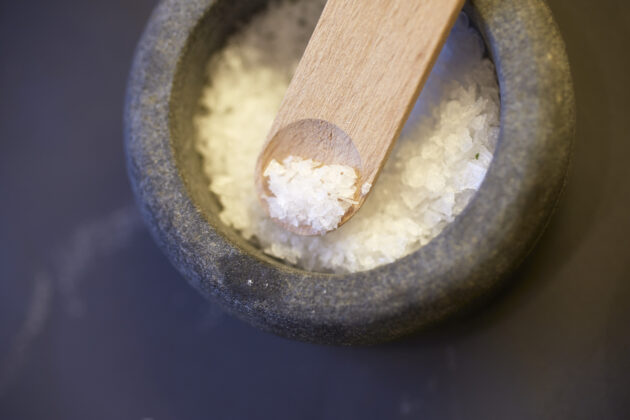Your emergency stockpile is missing one crucial ingredient

Your freezer might be loaded with fish and meat, but what happens if the power goes out? How can you preserve the food in your freezer? Coarse salt can be the solution.
Preserving food means treating or storing it in a way that prevents it from spoiling or deteriorating over time. The purpose is to keep the food fresh and safe to eat.
A few generations ago, it was common to preserve food oneself. Many people made salted herring, dried fish, dried meat, and pickled fruits and berries. Should the electricity go out of service, we can use these traditional methods to preserve our food.
In this article you will receive the best advice from our food experts.
Long shelf life with salt
Fish quality and salting expert and senior scientist at Nofima, Sjurdur Joensen, knows almost everything about how to store and preserve fish for the best quality and taste.
“Salting is a very simple way to preserve food. In fact, salt should be part of everyone’s emergency stockpile. If the power goes out and your freezer is full of fish, you can salt the fish to store it without refrigeration for longer periods,” explains Joensen.

The salted fish can remain preserved in salt for several months. With a salt content of around 20 per cent, bacteria that spoil the fish cannot grow, and the food is well kept.
How to salt fish
- Take the raw fish or fish fillet out of the freezer and out of its packaging.
- Sprinkle a layer of salt in a bucket or on a large tray.
- Place the fish on top of the salt and cover the fish with a thin layer of salt.
- You can stack several fish on top of each other with a layer of salt in between for better space utilisation.
- Use at least 0.5 kg of salt per kg of fish.
- Place the fish in the coolest spot you can find. Ideally between 10-15 degrees Celsius or colder.
Rinse the fish
Remember that the fish will now be too salty to eat, and you must therefore rinse it before further preparations.
Here is how:
- Place the fish in water for two days, changing the water once.
- Cook, fry, or heat-treat the fish before eating it.
“If you use enough salt, you don’t need to worry about the fish going bad, even if it’s warm outside,” says Sjurdur Joensen.
“And if the fish does go bad, you will quickly notice it from the smell,” he adds.
If you have limited amounts of salt, don’t worry; you can also dry the fish or combine salt and drying.
What about salmon and processed fish products?
What if you have salmon fillets in the freezer – can you salt them?
“Yes, you can. Cod will have an improved quality when salted compared to fatty salmon, but it is absolutely possible to salt salmon fillets as well.”
What do you do with fishcakes and fish fingers?
“Fishcakes are difficult to salt because they are fried. However, fishcakes will keep for a few days in the freezer if you keep it closed – even without power.”
“Otherwise, you should eat the food that spoils the fastest first,” advises the senior scientist.
Meat can also be salted
Many people also have meat in their freezers that can be preserved with salt. Scientist and meat expert at Nofima, Rune Rødbotten, explains:
“In principle, the same methods for salting, rinsing, and drying apply to meat as to fish. If you leave the meat in salt long enough, water will be drawn out, and salt will be absorbed, preserving the meat.”
However, it is not entirely simple to salt meat. Often, meat pieces are thicker than fish fillets, and the process takes longer with meat.
“Salt affects the proteins in the meat, changing both the taste and texture compared to untreated meat. Meat also has a firmer structure than fish.”
You can preserve the beef tenderloin you put in the freezer, but you cannot expect it to taste the same. The meat expert will, however, offer advice if you need to salt the beef tenderloin:
“When you eat the salted meat, it is no longer suitable for steaks but works well in stews or soups.”

Everyone should store coarse salt
It is not just individuals who should have coarse salt readily available during emergencies.
“This also applies to the authorities. Salt stockpiles across the country will give us the opportunity to preserve fish and meat in case the power goes out,” concludes Joensen.
Contact persons
Topics
Salt

